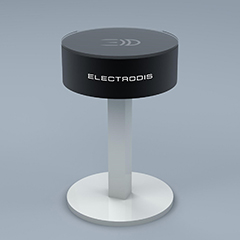Pioneering electromagnetics start-up challenges Kuwait’s gender imbalance
People are often surprised to learn that the Middle East is a world leader in terms of the proportion of women studying science, technology, engineering and mathematics (STEM). According to a 2015 report by UNESCO, in some Arab countries as many as 57 per cent of STEM graduates are women. Compare that to Europe and North America, where women make up only a third of STEM graduates.
Despite their academic achievements, however, a combination of restrictive laws, cultural expectations and familial pressures mean that many Arab women are unable to explore their potential in the job market upon graduating. Data from the World Bank reveals that only one in five women in the Arab world participate in the workforce – less than half the global average.
The need for female role models in tech start-ups
How can this situation be improved? Jenan Al-Shehab, an award-winning Kuwaiti electrical engineer and entrepreneur, believes society needs more female role models that women and especially young girls can relate to. As the founder and CEO of her own company, Electrodis Tech, Jenan is particularly aware of the scarcity of female leaders in the start-up world. Thankfully, her pioneering work in electromagnetism is helping to redress this imbalance.

Jenan’s passion for science and technology began as a child. Aged only 15 years old, she came third in a national science competition for designing an alarm system to alert coast guards to marine pollution. In 2010, during her first year at university, she appeared in the television show Stars of Science, in which young Arab innovators develop and pitch their inventions to a panel of experts. Jenan’s innovation was a medical device, which warns doctors if a patient is at risk of falling into a diabetic coma.
After earning her bachelor’s degree in Electrical Engineering from Kuwait University, Jenan took a job as a public relations consultant at a multinational technology corporation. The job was well-paid and stable, but – for someone who had always dreamed of becoming a full-time inventor – unfulfilling. “After a year of working in one of the biggest companies in the world, I didn’t find the passion that I was looking for,” Jenan recalls. “So in 2016 I resigned from my job and started working on one of my inventions, with the aim of turning it into a business and manufacturing it myself.”
Electrodis Tech – Powering Electromagnetic Transmission
Starting her own business was a risky decision: all-male start-ups in the Middle East vacuum up 99 per cent of all funding. Jenan approached various entrepreneurs and investors for funding and advice to launch her start-up, but found that most of them discouraged her from even attempting to start a business. “Compare it to wanting your car to be fixed,” she explains. “People here prefer going to a male mechanic instead of a female mechanic.” Undeterred, Jenan rented a workshop where she could develop an invention she began working on at university: an electromagnetic coupling system that can efficiently transmit and receive electricity. She named her company Electrodis Tech, which stands for electromagnetic distribution.
Wireless Power Transmission System

Jenan developed her idea into the “wireless power transmission system”, an electromagnetic cell capable of charging and activating electronic devices like televisions and computers up to 3 meters away. The cells can also be produced to fit any device. Aware of the novelty of her intellectual property, Jenan patented the wireless power transmission system in Kuwait and other Gulf countries. With an eye on the global possibilities of her invention, Jenan also obtained a patent from the United States Patent Office in 2019, and patents for other jurisdictions around the world are currently in progress. This intellectual property protection allowed her to enter the market and start selling her product.
Taking Center Stage in the Global Women Inventor Arena
Recognition quickly accompanied Electrodis’ progress. In 2018, Jenan received the Kuwait Prize for Science and Technology from Sabah Al-Ahmad Al-Jaber Al-Sabah, the then Kuwaiti Emir. The following year her invention was celebrated at the Global Women Inventor and Innovator awards, and in 2022 she earned the Gold Award at the China Shanghai International Technology Fair. This international recognition, together with her robust intellectual property portfolio, was instrumental in raising Jenan’s profile and earning the trust of investors. “The funny thing is, after all these years of work and reaching my goals, the same investors that discouraged me at the start are now the ones who want to invest in my company after seeing me succeed,” says Jenan.

Bureaucracy and patenting challenges
Electrodis may be a successful company today, but getting to this point has not been easy. “The challenges go on and on,” Jenan admits. “For every stage I reach, there is always a challenge.” Aside from the hostility to female-led start-ups, one of the biggest obstacles facing the fledgling business was Kuwaiti bureaucracy, which made it difficult for Jenan to obtain a business license. “The Public Authority of Industry in Kuwait has specific categories in which you can obtain a license,” she explains. “There was no existing category for my invention, which led to a lot of delays.” It ended up taking over a year to receive her license, which hindered product development. The patenting process raised further hurdles, especially regarding the proof of concept. “Were I to patent another invention, I would create a prototype for a practical proof of concept and conduct a full market study,” says Jenan.
Women in STEM
Jenan’s hope is that, as more women like her establish themselves as successful innovators and business owners, the challenges faced by the next generation of women in STEM will not be so great. “We need to start broadcasting women’s success stories to the world,” she insists. “We need to make people aware of how important it is for women and men to cooperate in the field of invention and innovation to make the world a better place with new ideas that make life easier.”
This case study was produced as part of a WIPO Development and Intellectual Property Committee project on Increasing the Role of Women in Innovation and Entrepreneurship, Encouraging Women in Developing Countries to Use the Intellectual Property System. Visit the Women in Innovation and Entrepreneurship webpage for more information about the project.
Source: WIPO

 Client Focus
Client Focus